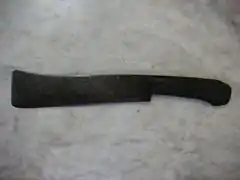Butcher knife
A butcher knife or butcher's knife is a knife designed and used primarily for the butchering or dressing of animal carcases.

Use
Today the butcher knife is used throughout the world in the meat processing trade. The heftier blade works well for splitting, stripping and cutting meat. The French chef's knife is a derivation of the butcher knife, and is used as a general utility knife. Other similar meat-cutting knives include the carving knife and the cleaver. The carving knife usually is designed for slicing thin cuts of meat and often has a blunt or rounded point, with a scalloped or Granton blade to improve separation of sliced cuts of meat. The cleaver is similar to the butcher's knife, but has a lighter and thinner blade for precision cutting.
History

From the late 18th century to the mid-1840s, the butcher knife was a key tool for mountain men. Simple, useful and cheap to produce, they were used for everything from skinning beaver, cutting food, self-defense, and scalping. During this time John Wilson, of Sheffield, England, was a major exporter of this type of knife to the Americans.[1] These knives can be identified by brand markings and the stamp I. Wilson.[2] Heavy cleavers were traditionally hung on a hook blade up for ease of access. Hook through the blade keeps the blade under control and leaves easy access to the handle when hung at chest height or a little bit higher.
References
- O. Ned Eddins. "Traders and Trappers of Beaver Pelts". thefurtrapper.com. Archived from the original on 2010-03-24.
- "Sheffield and Beeley Wood Steel Works" (PDF). The Portland Advertiser. 1 (60). March 11, 1831. p. 4 – via http://ScandinavianMountainMen.se.
